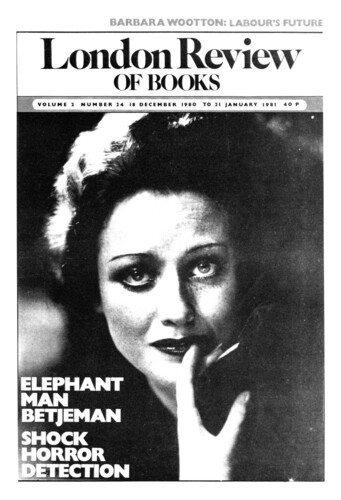Anita Brookner
Anita Brookner a reader in the history of art at the Courtauld Institute in London, is the author of a study of David and of two novels, A Start in Life and Providence.
Pieces about Anita Brookner in the LRB
Wintry Lessons: Anita Brookner
Dinah Birch, 27 June 2002
Anita Brookner’s first novel appeared in 1981. Since then she has published it again, slightly altered, almost every year. It is a remarkable feat. Nor is it irrelevant to what she has to...
Missing Mother: romanticism
Graham Robb, 19 October 2000
Trying to define Romanticism has always been a typically Romantic activity, especially in France. The word romantisme first appeared in the year of Napoleon’s coronation (1804) and soon...
Living with a little halibut
John Bayley, 8 October 1992
The novel and story depend a good deal on mystery. Pip has great expectations – where do they come from? – but more important, who is Pip, and what is he after? Everyone can be made...
Dreams of Avarice
Patrick Parrinder, 29 August 1991
‘The rich are different from us.’ ‘Yes – they have more money.’ Though it is Hemingway’s riposte that sticks in the memory, Scott Fitzgerald’s belief in...
Dirty Jokes
Julian Symons, 13 September 1990
‘Julia died. I read it in the Times this morning... I never liked her, nor did she like me; strange, then, how we managed to keep up a sort of friendship for so long.’ The first...
Looking for magic
Dinah Birch, 14 September 1989
It’s not long since the fairy story seemed the least political of genres. Not so today. A preoccupation with transformation and escape, coupled with a repudiation of the sober certainties...
Ruined by men
Anthony Thwaite, 1 September 1988
Alison Lurie’s new novel is, among other things, an anthology of several characters from her earlier novels. Readers unfamiliar with these books need not be apprehensive, however: The Truth...
Rachel and Heather
Stephen Wall, 1 October 1987
Anita Brookner’s novels have been preoccupied with women who feel themselves to be profoundly separate. This may be the result of either choice or necessity, or of stoically making a choice...
Ladies
John Bayley, 4 September 1986
‘Old people were rather in fashion at the time. Every week one or the other of the quality Sunday papers included a feature on the elderly, and if it could be shown that they were being...
Losers
Frank Kermode, 5 September 1985
So far as the evidence of five novels goes, Anita Brookner has one basic theme, which she varies with considerable and increasing technical resource. All five books are quite short, and all have...
The Great Exhibition
John Sutherland, 6 September 1984
A prefatory note testifies that Empire of the Sun draws on its author’s observations as a young boy swept up by the Japanese capture of Shanghai, and his subsequent internment in Lunghua...
Dear Sphinx
Penelope Fitzgerald, 1 December 1983
Ada Leverson (1862-1933) said she had learned about human nature in the nursery. A little brother got her to help him make a carriage out of two chairs, but when he was taken out in a real...
Travelling
Elaine Jordan, 21 April 1983
The 19th-century novel was the great forum for writing about life – from sanitation to the condition of women, from politics to love. All the novels reviewed here are very much of the 20th...
Submission
Robert Taubman, 20 May 1982
The voices in A Chain of Voices are those of 30 characters, Boer farmers and their hired labourers and slaves, in the Cape in the early 19th century. The voices are ‘all different yet all...
Fatalism
Graham Hough, 16 July 1981
The four novels before us are all highly original, but they tend to confirm an old popular belief – that there are two sexes and that there are some differences between them. All end sadly,...
Art and Revolution
Norman Hampson, 18 December 1980
In what her publishers claim to be the first monograph in English on David, Dr Brookner explains that she sees her book as a ‘preparation’ for more specialised studies at present...
Read anywhere with the London Review of Books app, available now from the App Store for Apple devices, Google Play for Android devices and Amazon for your Kindle Fire.
Sign up to our newsletter
For highlights from the latest issue, our archive and the blog, as well as news, events and exclusive promotions.

